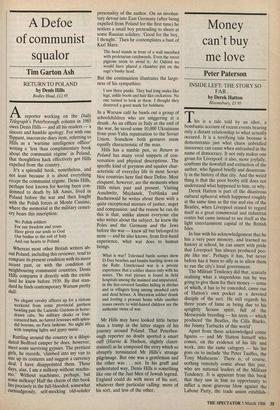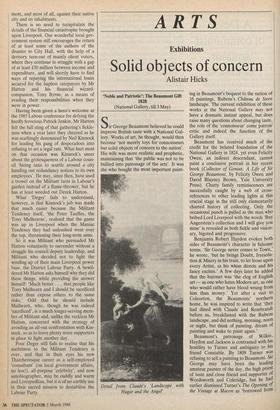Money can't buy me love
Peter Paterson
INSIDE LEFT: THE STORY SO FAR . . .
by Derek Hatton
Bloomsbury, £3.95
This is a tale told by an idiot, a bombastic account of recent events bearing only a distant relationship to what actually occured. It is a terrifying tale because it demonstrates just what chaos unbridled innocence can cause when unleashed in the name of democracy. It not only makes one groan for Liverpool: it also, more joyfully, confirms the downfall and extinction of the author, who figured briefly and disastrous- ly in the history of that city. And the weird thing is that the poor booby still does not understand what happened to him, or why. Derek Hatton is part of the disastrous cultural upheaval which happened roughly at the same time as the rise and rise of the Beatles, when Liverpool ceased to regard itself as a great commercial and industrial centre but came instead to see itself as the light entertainment capital of the British Isles.
In line with his acknowledgement that he has a very poor memory, and learned no history at school, he can assert with pride that Liverpool 'has always produced peo- ple like me'. Perhaps it has, but never before has it been so silly as to allow them to run the city's local government.
The Militant Tendency did that, scarcely realising what a stupendous run he was going to give them for their money — some of which, it has to be conceded, came out of Hatton's own pocket as a devoted disciple of the sect. He still regards his three years of fame as being due to his sprightly Scouse spirit, full of the Merseyside breeding — his term — which produced 'the Beatles, the Cilla Blacks, the Jimmy Tarbucks of this world'.
Apart from these acknowledged comic figures — and Mr Hatton himself who comes, on the evidence of his life and work, into the same category — his list goes on to include 'the Peter Taaffes, the Tony Mulhearns'. There is, of course, nothing remotely comic about this pair, who are national leadeis of the Militant Tendency. It is apparent from this book that they saw in him an opportunity to inflict a most grievous blow against the Labour Party, the trade union establish- ment, and most of all, against their native city and its inhabitants.
There is no need to recapitulate the details of the financial catastrophe brought upon Liverpool. Our wonderful local gov- ernment system still encourages the return of at least some of the authors of the disaster to City Hall, with the help of a derisory turn-out of mainly client voters, where they continue to struggle with a gap of at least £50 million between income and expenditure, and will shortly have to find ways of repaying the international loans secured for the hapless ratepayers by Mr Hatton and his financial wizard- companion, Tony Byrne, as a means of evading their responsibilities when they were in power.
Having been given a hero's welcome at the 1985 Labour conference for defying the hardly ferocious Patrick Jenkin, Mr Hatton felt the full sting of that gathering's fickle- ness when a year later they cheered as he was scathingly denounced by Neil Kinnock for leading his gang of desperadoes into refusing to set a legal rate. What hurt most on that occasion was Kinnock's sneer about the grotesqueness of a Labour coun- cil 'hiring taxis to scuttle around a city handing out redundancy notices to its own employees'. He may, since then, have used a trowel on the Militant tares in Labour's garden instead of a flame-thrower, but he has at least weeded out Derek Hatton.
What Degsy' fails to understand, however, is that Kinnock's job was made that much easier because the Militant Tendency itself, 'the Peter Taaffes, the Tony Mulhearns', realised that the game was up in Liverpool when the Maniac Tendency they had unleashed went over the top, threatening their long-term aims.
So it was Militant who persuaded Mr Hatton voluntarily to surrender without a struggle his council deputy leadership, and Militant who decided not to fight the winding up of their main Liverpool power base, the District Labour Party. A bewil- dered Mr Hatton asks himself why they did these things, while providing the answer himself: 'Much better . . . that people like Tony Mulhearn and I should be sacrificed rather than expose others to the same risks.' Odd that he should include Mulhearn, who, though he was indeed `sacrificed', is a much longer-serving mem- ber of Militant and, unlike the reckless Mr Hatton, concurred with the strategy of avoiding an all-out confrontation with Kin- nock, so as to leave plenty more supporters in place to fight another day.
Poor Degsy still fails to realise that his usefulness to the Militant Tendency is over, and that in their eyes his new Thatcheresque career as a self-employed `consultant' (on local government affairs, no less!), all-purpose 'celebrity', and now autobiographer, may be cuddly and warm and Liverpudlian, but it is of no earthly use in their sacred mission to destabilise the Labour Party.



















































 Previous page
Previous page